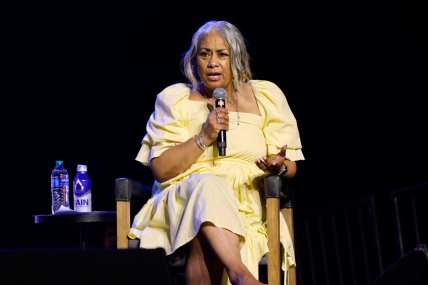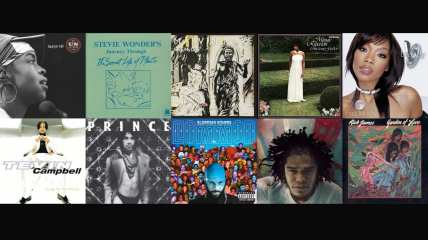Black music producers who changed the game
OPINION: In honor of Black Music Month, the Black music producers whose innovative techniques had a dramatic impact on several artists, producers and music genres are celebrated.
Editor’s note: The following article is an op-ed, and the views expressed are the author’s own. Read more opinions on theGrio.
What makes music so special is its constant evolution. When a musical movement takes ahold of the culture, most listeners think that it’s sparked by an artist. While that can be true, it’s usually the music producers who are the real innovators.
Kenny Gamble and Leon Huff helped define the Philadelphia Sound with songs like The O’Jays’ “For The Love of Money” and Harold Melvin & the Blue Notes’ “Wake Up Everybody“, but they also were big proponents of what became disco.
Quincy Jones had an extensive background as a producer and arranger in the jazz world, but he later used his talents to become the example that most pop musicians swear by even now.
The Neptunes’ sound — created by Pharrell Williams and Chad Hugo and infusing the albums of Snoop Dogg, Jay-Z, Mystikal, Usher, Nelly and half dozen more chart toppers — was so infectious and futuristic that it dominated the Billboard charts for more than a decade.
In honor of Black Music Month, theGrio is recognizing a list of producers who each launched a distinct musical movement.
James Brown
Music fans recognized James Brown as the prolific song and dance man who made funky tracks like “Cold Sweat,” “I Got You (I Feel Good),” and “Papa’s Got a Brand New Bag.” While he is given credit for being a great singer and bandleader, his production work in the studio with his band proved to be the roots of a tree whose branches include funk, soul, jazz and hip hop. Emphasizing “the one,” or the first beat of a bar and using melodic instruments as percussion made so much possible for generations of musicians and beat makers.
Lee “Scratch” Perry
Reggae and Caribbean music fusion with Black American music has been cyclical for many decades. Jazz and soul have influenced reggae. In turn, the riddim — Jamaican slang for rhythm — of reggae, dancehall and lovers rock has been infused with pop and R&B music for a long time. Lee “Scratch” Perry is a big part of why so much Caribbean music has left an imprint on American music. His innovation of dub music and experimentation with extending instruments and incorporating sound effects in the studio has been indelible for Black American music and reggae alike.
Sylvia Robinson
Before 1979, Sylvia Robinson was a respected and successful soul singer and songwriter. However, she will best be remembered as a visionary producer who codified the idea of hip hop and rap existing on wax. Her production on Sugar Hill Gang’s “Rapper’s Delight,” Grandmaster Flash & The Furious Five’s “The Message,” The Sequence’s “Funk You Up” and Funky 4+1’s “That’s the Joint” created the template of rap on record.
Larry Smith
When Sylvia Robinson laid the groundwork for rap music in the late 1970s and early 1980s, it still resembled the arrangements of disco and post-disco funk. Rap music’s identity as a hardcore, minimalist expression of reality was musically conveyed, thanks to Larry Smith. The bassist and composer’s production work like Run DMC’s “Sucker MC’s” and Whodini’s “Friends” gave the genre the meticulous masculine energy that has dominated the sound ever since.
Prince
Almost every time you would look at the back of a Prince album, it would also read, “Performed, composed, produced and arranged by Prince.” Music’s ultimate multi-hyphenate is praised for being a one-man band and crafting many hits during his lifetime. His production style not only defined the sound of one man but the sound of a whole city — Minneapolis. His mastery as a linn drum programmer and his swirlingly idiosyncratic rhythm guitar playing will inform the work of numerous artists for years to come.
Marley Marl
Marley Marl was one of the architects of sample-based hip hop. The Queens DJ and engineer is one of the precursors of collage-style sampling that The Bomb Squad and Dr. Dre would later refine. His work on songs like Eric B. & Rakim’s “Eric B. For President” established interpolating songs as a sampling alternative. Marley’s unique drum and rhythm patches and programming created a song that was singularly his. Songs like LL Cool J’s “Mama Said Knock You Out” and his posse cut, “The Symphony,” helped lead to the boom-bap era of hip hop production.
Timbaland
Most producers, artists and songwriters create music that can be traced back to an inspiring agent. For Timbaland, finding the piece from which it was derived is almost impossible. When he and Missy Elliott created their material for Aaliyah’s “One in a Million,” it was a flagpost of a new era of contemporary R&B music. From there to his work on Missy’s solo albums, as well as with Ginuwine, Jay-Z and Justin Timberlake, Timbaland’s beats were so futuristic that the tracks still sound ahead of the curve more than two decades later.
J Dilla
Some producers influence sampling. Some producers influence sound effects. Some producers influence vocal arrangements. How many producers can say they influenced time? J Dilla can. The late Detroit producer was a disciple of Q-Tip and Pete Rock when it comes to sampling, but his approach to drum programming put the human element into hip hop rhythm. The swing of songs like A Tribe Called Quest’s “Find a Way” and Slum Village’s “The Look of Love” set the tone for the neo-soul movement and the current crop of jazz musicians like Robert Glasper Terrace Martin and Thundercat.
As we continue to make our way through the 21st century, the influence of these music producers remains evident in the music of so many superstars. With so much outstanding work being done today, it’s only a matter of time before the next movement occurs. Who will be the producer who sparks it?
______________________

Matthew Allen is a Brooklyn-based TV producer, director and award-winning music journalist. He’s interviewed the likes of Quincy Jones, Jill Scott, Smokey Robinson and more for publications such as Ebony, Jet, The Root, Village Voice, Wax Poetics, Revive Music and Soulhead. His video work can be seen on PBS/All Arts, Brooklyn Free Speech TV and BRIC TV.
TheGrio is FREE on your TV via Apple TV, Amazon Fire, Roku and Android TV. Also, please download theGrio mobile apps today!


